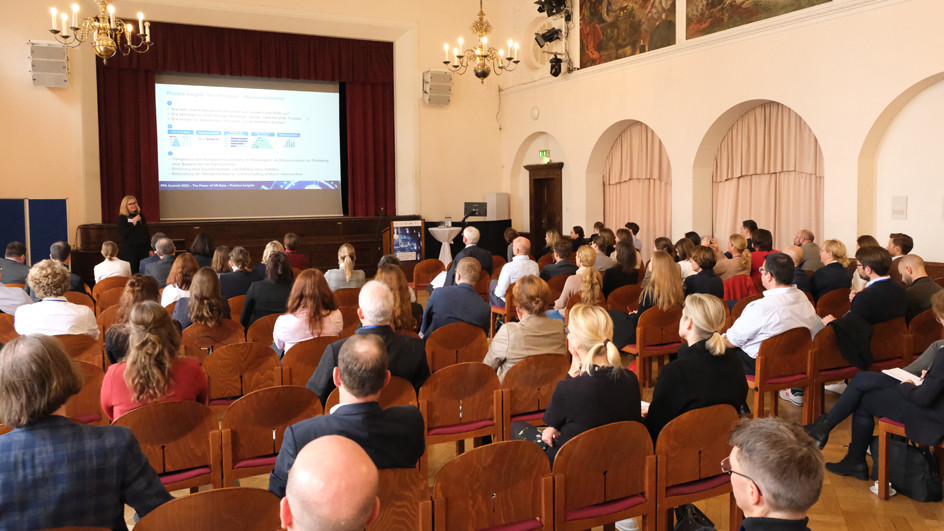The future of HR management is data-driven; the challenging yet rewarding path ahead should be embarked upon slowly – as concluded at the PPA Summit: The Power of HR Data, which was organized by the Ludwig Maximilian University of Munich, the ifo Institute and the hkp/// group on October 13th in the Scholastika of the Akademische Gesangverein in Munich.
The forward-looking discussion, which took place against a historical backdrop, featured keynote speeches, impulses and workshops by renowned academics and HR managers, highlighting the potential, practical examples and scientific findings of evidence-based HR work for more than 120 participants. At the same time, key challenges were identified that are critical to implementing effective and responsible work with data in HR.
The potential of HR data
Data-driven HR replaces guesswork in HR with evidence and thus gives HR managers the opportunity, just like colleagues from marketing and finance, to argue on the basis of measurable metrics, for example, Janina Kugel, multi-supervisor and advisor, underlined in her keynote.
Prof. Dr. Clemens Fuest, President of the ifo Institute, fleshed out the benefits of HR data in the first panel discussion based on three core areas: HR data can potentially be used to understand the effects of past measures (forensics), they can potentially show what is currently going on (real-time analysis) and they can sometimes make future developments predictable or calculable (predictive analytics). This possibility, as was expressed in the various contributions at the conference, is highly relevant for many application areas in HR: from recruiting, combating employee turnover and retention, to skills or diversity management. This is because the data provide answers, or at least important clues, to questions that are currently particularly pressing in these and other fields of application.
Dr. Ingrid Hägele, LMU, among others, made this clear on the basis of a long-term diversity study in a corporate group. Here, the data allowed conclusions to be drawn about motives and positions that cause female employees to leave the career path, resulting in fewer women in management positions. Ivana Dedus, Managing Director Human Resources, Finance, IT, DB Zeitarbeit, provided the appropriate practical perspective in a workshop and showed how online analytics can help in women's recruiting. hkp/// group Senior Partner Petra Knab-Hägele, in turn, explained how employee, organizational and compensation data in combination can reveal structural problems and optimization needs - and thus become a valuable tool for corporate management, answering, for example, what staffing levels it needs for specific, targeted corporate goals.
HR data: From guesswork to key player for strategic corporate management
HR data is therefore also relevant to the entire company outside of HR. “HR data does not yet play a major role in supervisory boards, but that is coming!” predicted Janina Kugel, for example. In this respect, data-based HR work has the long-term potential to decisively change the perception of HR management within companies: PPA Summit host Prof. Dr. Florian Englmaier, Professor of Organizational Economics, Dean of the Faculty of Economics at the Ludwig Maximilian University of Munich (LMU) and Director of the Predictive People Analytics Initiative (PPA), also emphasized the need to move away from departments that make decisions based on soft factors and guesswork without data to back them up to key players that provide highly relevant data for the development and management of the organization.
The panel discussion between hkp/// group partner Petra Knab-Hägele, Dr. Vanda Rothacker (ESG analyst at Union Investment), Prof. Dr. Theo Siegert (Multi Supervisory Board), and Gina Vargiu-Breuer (Senior Vice President Global HR, Siemens Energy), moderated by Handelsblatt reporter Larissa Holzki, highlighted the fact that the stronger focus of institutional investors on employee concerns, which is playing an increasingly important role in the course of ESG criteria, will ultimately also contribute to this. The bottom line: The capital market also demands essential KPIs on employee matters that are comparable across industries and traceable in their development - but standards on what exactly is reported and in what form are still in the process of negotiation. This requires a more intensive engagement process between companies and investors, in which HR will be more in demand in the future.
Challenges on the way to data-driven HR work
In addition to the potential of data-driven HR work, the various contributions by the speakers also named a large number of challenges that need to be solved. The good news: Some companies have already set out on the path and offer impressive examples. Many speakers encouraged the HR managers present to learn from their experiences. In addition, Dr. Ingrid Hägele said in her Research Insight that cooperation with the scientific community is also a good way to collect and evaluate data. The sobering news: The road to systematic, data-driven HR work is long and sometimes bumpy, as was expressed in many presentations.
In summary: First and foremost, the possibilities within the framework of data protection must be explored, and actually more leeway would also be needed from the legislator. It is also important to create acceptance. It is best to bring employees along on the journey early on by explaining the benefits of data-driven HR to them. After all, it is not only the companies that can benefit, but also the employees, for instance in the form of more individualized development opportunities, a more pleasant working environment, and faster HR services. It also needs transparency: Employees must know what data is processed for what purpose and in what form (anonymized vs. personalized). This would also increase the willingness to voluntarily provide personal data.
Creating the conditions for evidence-based HR work with HR data
There is still a need for more digital competence in HR in order to understand how the tools used work and what their implications are. In addition, there is a need for data analysts who are familiar with the generation, evaluation and interpretation of data. Ideally, goals for data analysis should be defined in advance: What do you want to learn? What do you want to change? Then you need the appropriate IT infrastructure, which does not consist of countless tools side by side, but must have interfaces that enable the generation of “data lakes” as sources of data analysis. Fundamentally important here: ensuring high data quality - otherwise the results could be misleading, leading to incorrect decisions being made about people. In this respect, ethical issues must also be taken into account when it comes to HR data.
At the conference, this was done through the HR Tech Ethics Advisory Board workshop by Dr. Elke Eller, Supervisory Board member and investor, and Prof. Dr. Martin Kersting, Professor of Psychological Diagnostics at Justus Liebig University in Giessen. Together with the participants, they discussed operationalization options for some of the ten guidelines developed by the HR Tech Ethics Advisory Board for the responsible use of artificial intelligence in HR management.
In view of these enormous challenges and the status quo of digitization in HR, many speakers stated that the first thing to do now is to ensure “digital readiness”, to exchange ideas and to create use cases from which other companies can learn. The first PPA Summit on The Power of HR Data organized by the LMU, ifo Institute and hkp/// group made a valuable contribution to this.
Video interviews from the PPA-Summit (in German)
- Dr. Elke Eller, Aufsichtsrätin und Investorin, Mitinitiatorin des Ethikbeirat HR-Tech: HR-Daten und Workforce Analytics - wir müssen an der Readiness arbeiten
- Prof. Dr. Florian Englmaier, Professor für Organisationsökonomik, Ludwig-Maximilians-Universität München (LMU), und Direktor der Predictive People Analytics Initative (PPA): HR Data & Workforce Analytics: nicht einfach, aber alternativlos
- Prof. Dr. Dr. h.c. Clemens Fuest, Präsident des ifo Institut, Professor für Volkswirtschaftslehre an der Ludwig-Maximilians-Universität München (LMU): Big Data in HR: die Technologien sind da, sie müssen nur genutzt werden
- Prof. Dr. Martin Kersting, Professor für Psychologische Diagnostik an der Justus-Liebig-Universität Gießen, Mitglied im Ethikbeirat HR-Tech: HR-Daten und People Analytics - die Erfindung des Mikroskops für HR
- Janina Kugel, Multi-Aufsichtsrätin & Advisor: Datenbasiertes HRM durch Zusammenarbeit forcieren


